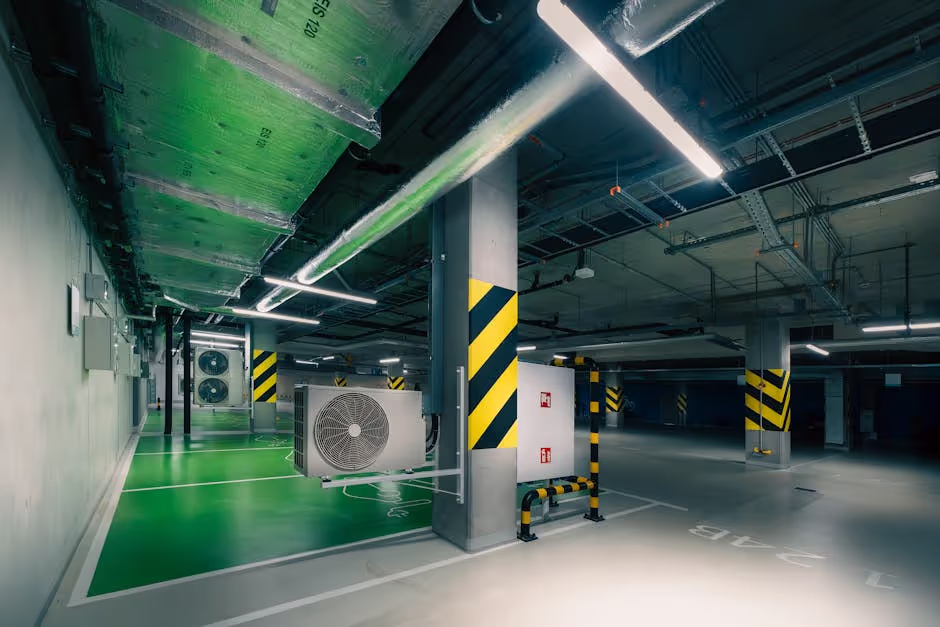Why Finding the Most Efficient Air Conditioning System Matters for Your Home
The most efficient air conditioning system can transform your home comfort while dramatically reducing your energy bills. Here are the top contenders for maximum efficiency:
- Geothermal Heat Pumps: SEER ratings of 20-25, saving 30-50% on energy bills.
- Ductless Mini-Split Systems: SEER2 ratings up to 28, ideal for zoned cooling.
- High-Efficiency Central Air: SEER2 ratings of 20+ for top models, perfect for homes with ductwork.
As energy costs climb across Pennsylvania, an efficient AC system is a smart investment. The right system can cut cooling costs by 30% or more, improve indoor air quality, and reduce your environmental impact. But with so many new technologies, how do you choose the best system for your specific situation?
I'm Bill Scott, general manager of Smart Climate Solutions. With over 15 years in the HVAC industry, I've helped thousands of Pittsburgh-area homeowners find their ideal most efficient air conditioning system. The key is matching the right technology to your home's unique needs, local climate, and budget.

Basic most efficient air conditioning system glossary:
Decoding AC Efficiency: What the Ratings Really Mean
Shopping for the most efficient air conditioning system means understanding a few key ratings: SEER2, EER2, and the ENERGY STAR label. Think of these ratings like a car's MPG-the higher the number, the more cooling you get for each dollar of electricity.
- Seasonal Energy Efficiency Ratio 2 (SEER2): Measures efficiency over an entire cooling season.
- Energy Efficiency Ratio 2 (EER2): Measures efficiency at peak performance (e.g., a 95-degree day).
The role of ENERGY STAR in setting standards provides a trusted benchmark. A system with the blue label meets strict, verified efficiency guidelines. Understanding these ratings for your Climate Systems helps you make a smart choice that pays off for years.
What is a Good SEER2 Rating?
SEER2 measures how efficiently an AC performs across a whole season, from mild spring days to hot July afternoons. While the federal minimum is 14.5 SEER2, I recommend 16 SEER2 or higher for Pittsburgh's climate to see real savings.
ENERGY STAR certified systems meet even stricter requirements, with top-tier models reaching 20+ SEER2 and some hitting an impressive 28 SEER2. While these systems have a higher upfront cost, the long-term savings are significant. Our hot, humid summers mean a high-efficiency unit quickly pays for itself through lower electric bills over its 15-20 year lifespan.
Understanding EER2 and Its Importance
While SEER2 shows the big picture, EER2 measures peak performance. This is crucial during Pennsylvania's heat waves. Think of SEER2 as a car's combined MPG, while EER2 is its performance climbing a steep hill.
A system with a high SEER2 but low EER2 might struggle on the hottest days, driving up your bill when you need cooling most. Look for systems with an EER2 rating of 13 or higher to ensure strong performance during peak demand. The best systems excel at both, delivering efficiency in real-world conditions.
The Top Contenders for the Most Efficient Air Conditioning System
Several outstanding options exist for the most efficient air conditioning system, and the perfect choice depends on your Pittsburgh home's layout, infrastructure, and comfort goals.
Here's how the top contenders stack up:
| System Type | Efficiency (SEER2 Range) | Best For | Installation Needs |
|---|---|---|---|
| Central Air | 14.5 - 20+ | Larger homes with existing ductwork | Requires extensive ductwork, outdoor unit, indoor coil |
| Ductless Mini-Splits | 16 - 28 | Zoned cooling, additions, homes without ducts | Indoor and outdoor units connected by conduit |
| Air-Source Heat Pumps | 14.5 - 25 | Dual heating/cooling, moderate climates | Similar to central AC, but also provides heat |
| Geothermal Heat Pumps | 20 - 25+ | Long-term savings, stable temperatures | Extensive underground loop system |
For more details, see our guide on Residential Heating and Cooling Options.
High-Efficiency Central Air Conditioners
For larger Pittsburgh homes with existing ductwork, a high-efficiency central air conditioner provides excellent whole-home cooling. When paired with furnaces, these systems create a complete climate solution. Top models achieve SEER2 ratings around 20, thanks to variable-speed technology. Instead of wasteful on-off cycling, these systems adjust their output to match your cooling needs, running longer at lower speeds to maintain steady temperatures and use less electricity. If your home already has ducts, upgrading is straightforward. We can help you find An Air Conditioning System for your home.
Ductless Mini-Split Systems
Ductless mini-splits offer incredible zoned cooling and heating with some of the highest efficiency ratings available, reaching up to 28 SEER2. With no ductwork needed, installation is less invasive, making them perfect for additions, sunrooms, or older homes. Each indoor unit connects to an outdoor unit via a small conduit, allowing for flexible installation. You can control each zone independently, cooling only the rooms you use and potentially cutting cooling costs by 50%. This makes them ideal for situations like HVAC Solutions for Residential Apartments.
High-Efficiency Heat Pumps: The All-in-One Solution
Heat pumps provide both heating and cooling, making their dual-role functionality appealing for Pittsburgh's year-round comfort needs. They are highly efficient because they transfer heat rather than creating it.
- Air-source heat pumps are common, achieving SEER2 ratings of 20-25 and performing well even in Pittsburgh's winters.
- Geothermal heat pumps are the pinnacle of efficiency. They use the earth's stable underground temperature, delivering 30-50% energy savings. While the upfront investment is higher, the long-term savings and long lifespan (50+ years for underground loops) make them a compelling choice for the ultimate most efficient air conditioning system. Learn more about how heat pumps work.
Key Technologies Driving Modern AC Efficiency

The most efficient air conditioning system relies on brilliant technologies working behind the scenes. Unlike older, crude systems, today's ACs are precision instruments that sip electricity. The two biggest game-changers are inverter technology and smart home integration, which are key to achieving impressive SEER2 ratings.
How Variable-Capacity and Inverter Compressors Work
Traditional air conditioners run at full blast and then shut off, a wasteful process like stop-and-go traffic. In contrast, variable-capacity and inverter compressors make constant adjustments, matching their output to your home's exact needs. The system runs longer at much lower speeds, maintaining consistent temperatures and using far less energy.
This technology also results in whisper-quiet operation, eliminating the jarring sound of an AC kicking on. It's the core reason modern heat pumps and ductless systems are so efficient. See how variable-capacity technology maintains precise comfort.
The Power of Smart Thermostats
Smart thermostats act as a personal assistant for your comfort and savings. They go beyond simple programming by learning your schedule to optimize performance automatically. Features like geofencing can detect when you're approaching home and start cooling in advance.
With remote access and control via your phone, you can adjust settings from anywhere, preventing energy waste while ensuring comfort. Smart thermostats also provide detailed energy usage reports, empowering you to make informed decisions. When paired with variable-speed equipment, they maximize system performance by precisely coordinating your most efficient air conditioning system. For more ways to optimize performance, see our Energy Saving HVAC Tips.
Choosing the Right System for Your Pittsburgh Home
Finding the most efficient air conditioning system for your home in Pittsburgh, South Hills, or Weirton means matching the unit to your home's unique needs and our region's climate. Our local expertise ensures we understand how different systems perform in Western Pennsylvania homes. Explore our Residential HVAC Solutions to see how we approach each situation.
Factoring in Your Home's Size, Layout, and Insulation
Bigger isn't better with AC units. The key is proper sizing using a Manual J load calculation, which assesses your home's square footage, windows, insulation, and more. A well-insulated home needs a smaller, more efficient system. An oversized unit will short-cycle, wasting energy and failing to remove humidity, while an undersized unit will run constantly and struggle to cool. Neither is efficient.
Poor insulation forces your most efficient air conditioning system to work harder to overcome energy loss. Proper sizing ensures you get the comfort and efficiency you're paying for.
Navigating Pittsburgh's Climate for the most efficient air conditioning system
Pittsburgh's climate, with its humid summers and cold winters, makes system choice critical. For most local homes, a high-efficiency heat pump is an excellent choice for both heating and cooling. Modern units work efficiently even when temperatures drop into the teens.
For the coldest winter days, a dual-fuel system is often the best bet. This pairs an electric heat pump with a gas furnace. The heat pump handles most of the work, and the furnace kicks in automatically during extreme cold. This approach provides maximum efficiency in the summer and reliable warmth in the winter.
Maximizing Savings with Rebates and Tax Credits
Investing in a new HVAC system can be more manageable with available incentives. Federal tax credits and local utility rebates for ENERGY STAR certified systems can significantly reduce your upfront costs. These programs change, so it's important to check what's available. We help our customers steer these opportunities to make high-efficiency systems more affordable. Check for available rebates in your area to see what you might qualify for.
The Unsung Hero of Efficiency: Proper Installation and Maintenance

Even the most efficient air conditioning system will underperform if it's not installed and maintained correctly. Poor installation or neglected maintenance can undermine a top-tier system's efficiency. Professional installation and consistent care are what turn a great piece of equipment into a reliable, long-term comfort solution.
Why Professional HVAC Installation is Non-Negotiable
Installation quality determines your system's efficiency. Poor installation is the most common reason a new, "efficient" system fails to deliver. Key steps include:
- Correct Sizing and Placement: We perform detailed load calculations to match the system perfectly to your home, avoiding the inefficiency of oversized or undersized units.
- Ductwork Sealing and Testing: Leaky ducts can waste up to 30% of your conditioned air. We seal and test all connections to ensure air goes where it's needed.
- Proper Refrigerant Charging: Too little or too much refrigerant hurts efficiency and can damage the compressor. We charge every system to exact factory specifications.
- Safety and Code Compliance: Our certified technicians ensure every installation meets or exceeds local codes, protecting your family and your investment.
Choosing our HVAC Installation Services is an investment in long-term performance.
Essential Maintenance Tasks for Long-Term Efficiency
Regular maintenance keeps your system in peak condition and prevents costly problems. Key tasks include:
- Regularly changing air filters: A clogged filter restricts airflow and reduces efficiency. Check your filter monthly and replace it every 1-3 months.
- Cleaning outdoor condenser coils: Dirt and debris on outdoor coils prevent the system from releasing heat effectively. A gentle rinse with a hose helps.
- Keeping vents and registers clear: Ensure furniture or curtains don't block vents, as this restricts airflow.
- Scheduling annual professional tune-ups: Our technicians inspect connections, check refrigerant, and clean components to keep your most efficient air conditioning system running at peak performance.
For comprehensive HVAC Service and Repair in the Pittsburgh area, our team is ready to help.
Frequently Asked Questions about High-Efficiency AC
Here are answers to common questions about investing in the most efficient air conditioning system for your home.
What is the most efficient air conditioning system available today?
The most efficient air conditioning system varies by home. In terms of pure numbers, geothermal heat pumps are often at the top (SEER 20-25+), with operating costs 30-50% lower than conventional systems. However, ductless mini-splits (up to 28 SEER2) and high-efficiency central air (20+ SEER2) are also excellent contenders.
The "best" system is one that is properly sized for your home, fits your budget, and is expertly installed. A perfectly matched system will always outperform a high-SEER unit that's wrong for the space.
How much can I really save by upgrading to an energy-efficient AC?
The savings can be significant. Upgrading from an old system (8-10 SEER) to a new ENERGY STAR model (16+ SEER2) can reduce your cooling costs by 30% or more. With top-tier systems (20+ SEER2), you could cut cooling bills by 50%. Over the system's 15-20 year lifespan, these energy savings often pay for the initial investment, all while providing better comfort and air quality.
Can I just replace my outdoor AC unit and not the indoor furnace or air handler?
We strongly advise against this. Modern high-efficiency systems are designed as matched sets. Pairing a new, efficient outdoor unit with an old indoor coil is like putting a high-performance engine in a car with a worn-out transmission. You won't get the advertised efficiency.
Mismatching components compromises efficiency, performance, and system lifespan. It can also void the manufacturer's warranty. To get the full benefit of your investment in the most efficient air conditioning system, always replace the indoor and outdoor components together.
Conclusion
Finding the most efficient air conditioning system is about creating harmony between technology, your home's needs, Pittsburgh's climate, and expert installation. As we've seen, understanding SEER2 ratings, inverter compressors, and smart thermostats is key to choosing a system that can cut energy bills by 30% or more.
Whether you choose a geothermal heat pump, a ductless mini-split, or a high-efficiency central air system, the path to better comfort and efficiency is clear. However, the most efficient air conditioning system is only as good as its installation and maintenance. Proper sizing, expert installation, and regular care are essential to getting the performance you pay for.
At Smart Climate Solutions, our local expertise in Pittsburgh, South Hills, and surrounding areas means we know how to match the right system to your home. We help you steer federal tax credits and local rebates to make your investment more accessible.
Your comfort shouldn't come at the expense of your budget. Ready to transform your home comfort while protecting your wallet? Contact us today to discuss your home comfort needs and get a professional recommendation. Let's find your ideal most efficient air conditioning system together.





.avif)
.avif)
.png)
